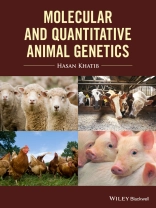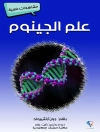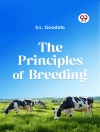Animal genetics is a foundational discipline in the fields of animal science, animal breeding, and veterinary sciences. While genetics underpins the healthy development and breeding of all living organisms, this is especially true in domestic animals, specifically with respect to breeding for key traits.
Molecular and Quantitative Animal Genetics is a new textbook that takes an innovative approach, looking at both quantitative and molecular breeding approaches. The bookprovides a comprehensive introduction to genetic principles and their applications in animal breeding. This text provides a useful overview for those new to the field of animal genetics and breeding, covering a diverse array of topics ranging from population and quantitative genetics to epigenetics and biotechnology. Molecular and Quantitative Animal Genetics will be an important and invaluable educational resource for undergraduate and graduate students and animal agriculture professionals.
Divided into six sections pairing fundamental principles with useful applications, the book’s comprehensive coverage will make it an ideal fit for students studying animal breeding and genetics at any level.
İçerik tablosu
Contributors, xiii
Manuscript reviewers, xv
Preface, xvii
1 Decoding and Encoding the ‘DNA’ of Teaching and Learning in College Classrooms 1
Michel A. Wattiaux
Section 1: Quantitative and Population Genetics 13
2 Mating Systems: Inbreeding and Inbreeding Depression 15
David L. Thomas
3 Genomic Selection, Inbreeding, and Crossbreeding in Dairy Cattle 25
Kent Weigel
4 Basic Genetic Models for Quantitative Traits 33
Guilherme J. M. Rosa
5 Heritability and Repeatability 39
Guilherme J. M. Rosa
6 Applications of Statistics in Quantitative Traits 43
Hayrettin Okut
Section 2: Applications of Genetics and Genomics to Livestockand Companion Animal Species 65
7 Genetic Improvement of Beef Cattle 67
Michael D. Mac Neil
8 Genetic Improvement in Sheep through Selection 73
David L. Thomas
9 Genetic Improvement Programs for Dairy Cattle 85
Kent Weigel
10 Genetic and Genomic Improvement of Pigs 97
Max F. Rothschild
11 Equine Genetics 107
Jennifer Minick Bormann
12 Genetics and Genomics of the Domestic Dog 121
Leigh Anne Clark and Alison Starr-Moss
13 The Sheep Genome 131
Noelle E. Cockett and Chunhua Wu
14 Goat Genetics and Genomic Progress 137
Mulumebet Worku
Section 3: Molecular Genetics of Production and Economically Important Traits 143
15 Bioinformatics in Animal Genetics 145
José A. Carrillo and Jiuzhou Song
16 Genome-wide Association Studies in Pedigreed Populations155
Dirk-Jan De Koning
17 Molecular Genetics Techniques and High Throughput Technologies 163
Wen Huang
18 Single Genes in Animal Breeding 177
Brian W. Kirkpatrick
19 Molecular Genetics of Coat Color: It is more than Just Skin Deep 187
Samantha Brooks
20 Molecular Genetics-Nutrition Interactions in Ruminant Fatty Acid Metabolism and Meat Quality 197
Aduli E.O. Malau-Aduli and Benjamin W.B. Holman
21 Nutritional Epigenomics 215
Congjun Li
Section 4: Genetics of Embryo Development and Fertility227
22 Genomics of Sex Determination and Dosage Compensation229
Jenifer Cruickshank and Christopher H. Chandler
23 Functional Genomics of Mammalian Gametes and Preimplantation Embryos 239
Sule Dogan, Aruna Govindaraju, Elizabeth A. Crate, and Erdogan Memili
24 The Genetics of In Vitro Produced Embryos 257
Ashley Driver
Section 5: Genetics of Animal Health and Biotechnology263
25 Understanding the Major Histocompatibility Complex and Immunoglobulin Genes 265
Michael G. Gonda
26 Livestock and Companion Animal Genetics: Genetics of Infectious Disease Susceptibility 275
Michael G. Gonda
27 Animal Genetics and Welfare 283
Amin A. Fadl and Mark E. Cook
28 Animal Biotechnology: Scientific, Regulatory and Public Acceptance Issues Associated with Cloned and Genetically Engineered Animals 289
Alison L. Van Eenennaam
29 Intellectual Property Rights and Animal Genetic Resources303
Jennifer Long and Max F. Rothschild
Index 311
Yazar hakkında
Hasan Khatib is an Associate Professor in the Department of Dairy Science at the University of Wisconsin-Madison. Dr. Khatib has taught a variety of undergraduate and graduate courses on animal breeding and genetics. He is also the lead editor of Livestock Epigenetics published by Wiley in 2012.












